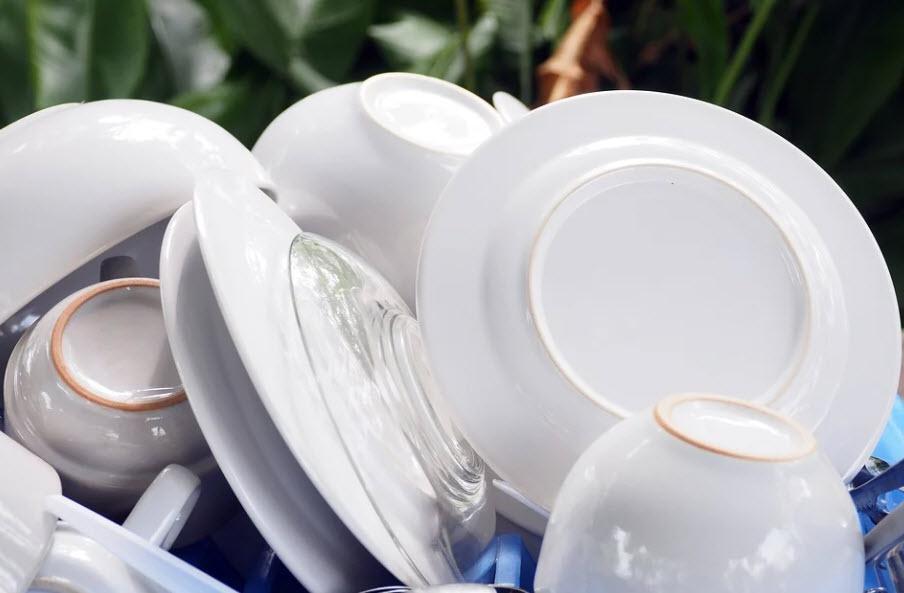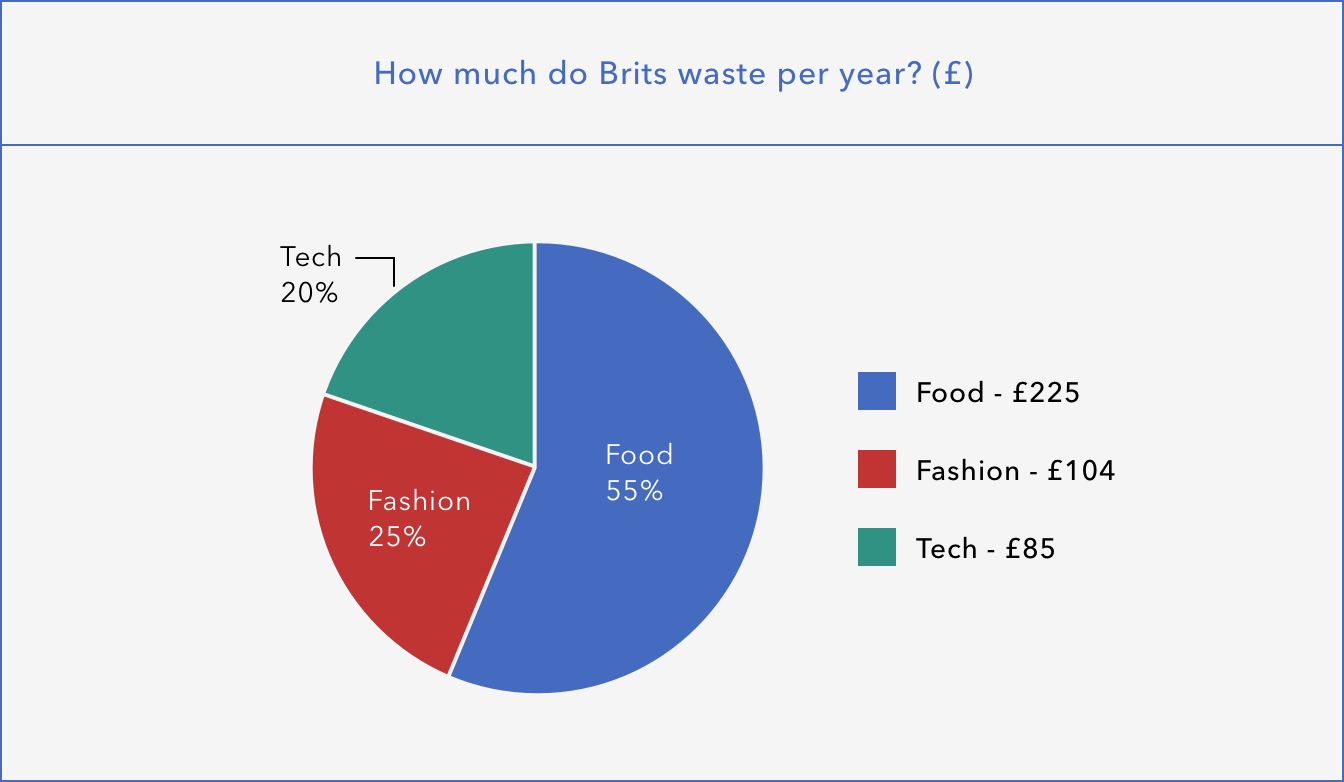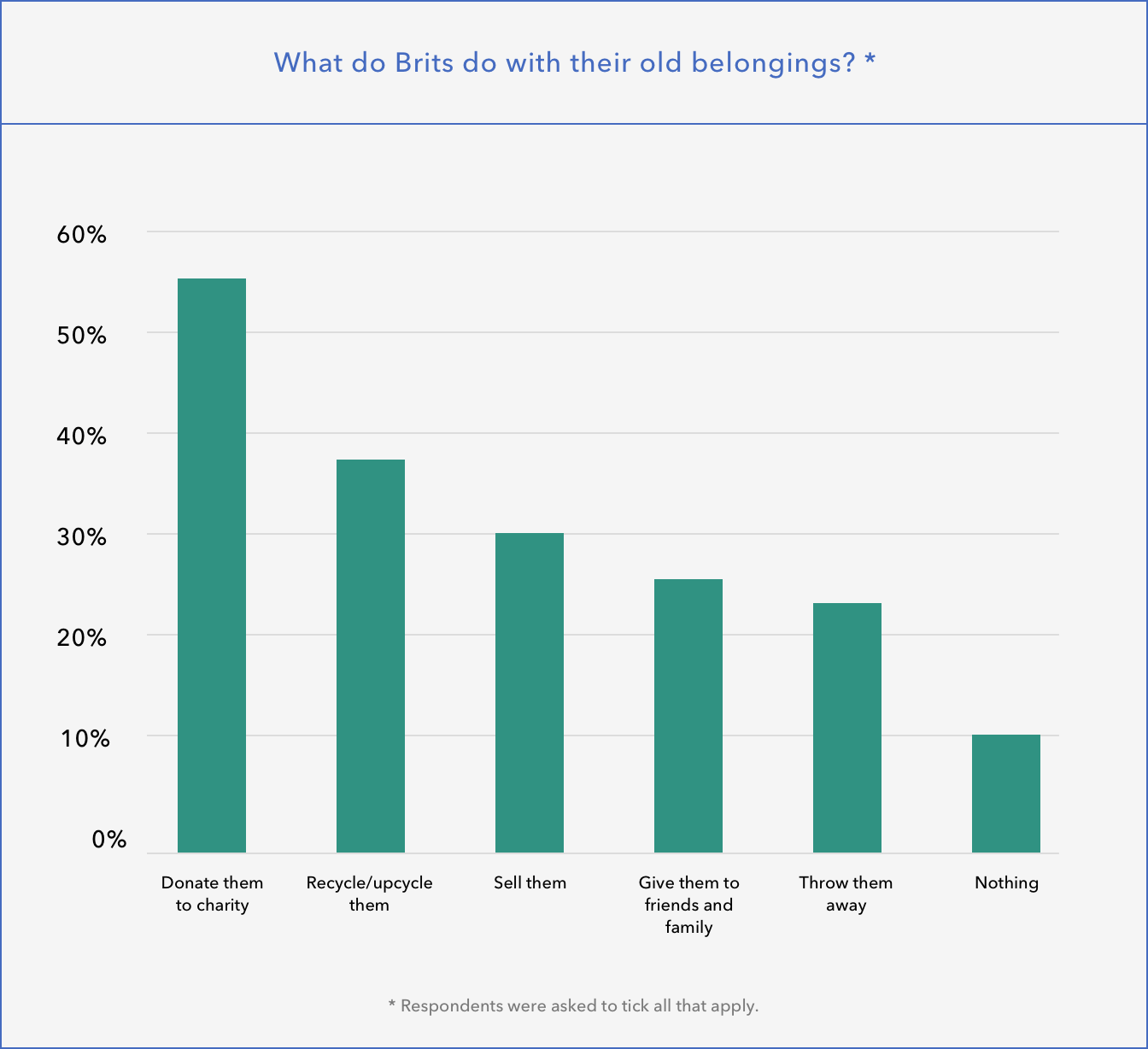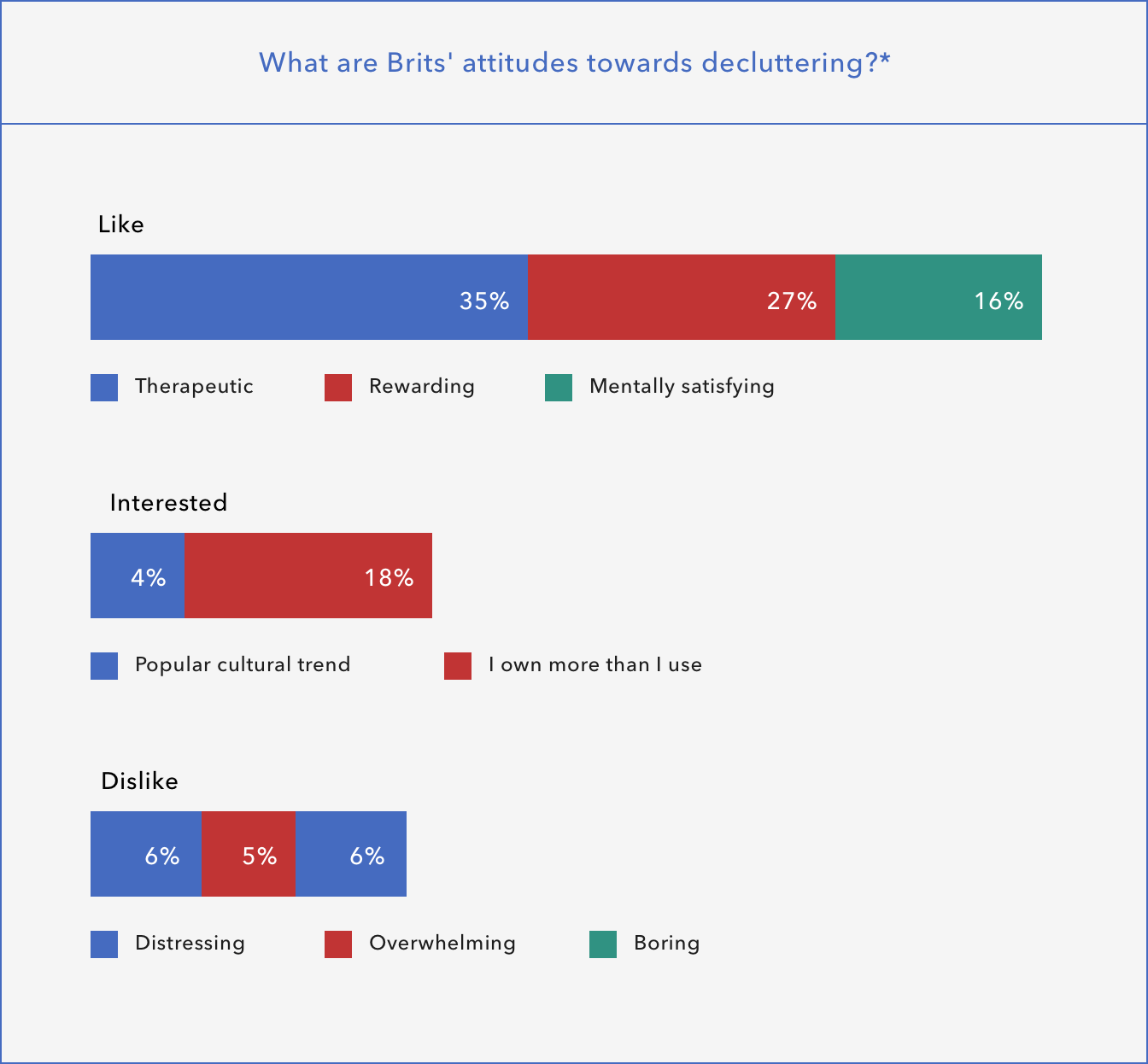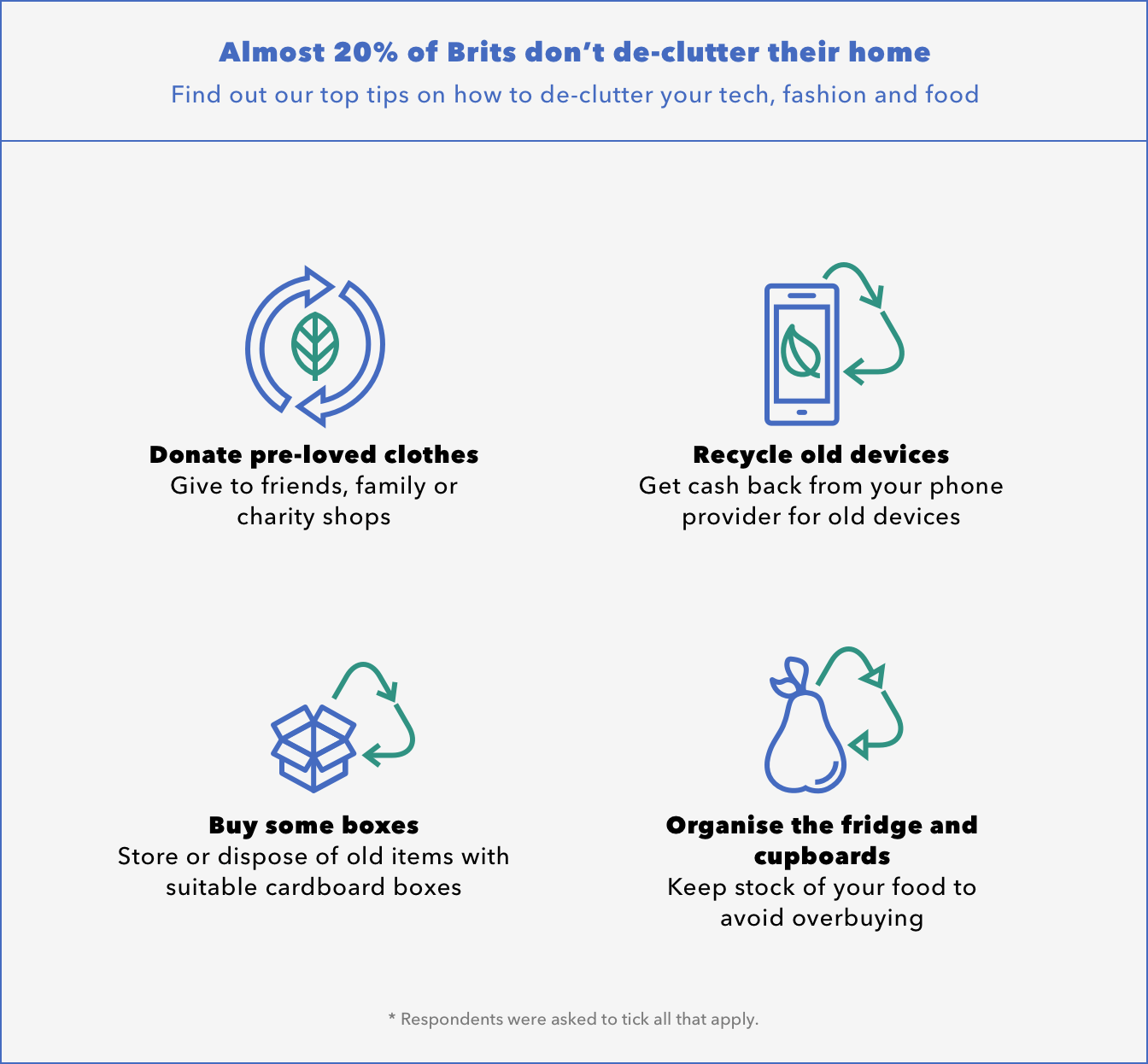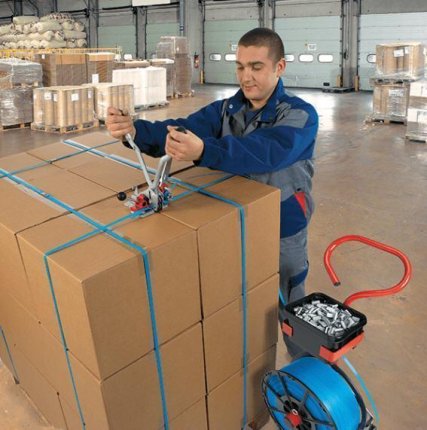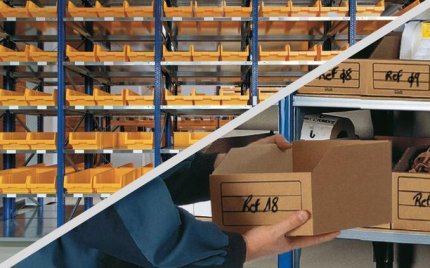The de-cluttering craze is everywhere right now; as the focus of countless self-help books, the mainstay of many organisation gurus – and even the subject of a popular Netflix series. It’s also been the inspiration behind motivational quotes like Marie Kondo’s: “Discard everything that does not spark joy”.
This philosophy is a popular one: the promise that we can maximise our lives with a minimalist lifestyle. But, by putting our old belongings into cardboard boxes and bidding them farewell, can we really put more meaning into our lives?
We wanted to find out what Brits make of this movement, and whether they’ve felt a benefit from a purge of their possessions. To do this, we surveyed over 1,000 respondents on their attitudes to de-cluttering food, fashion and technology products in their homes.
How much are Brits wasting on food, fashion and technology?
First, we had to determine if there was a need to de-clutter. The answer? Yes.
We found that, on average, Brits are wasting a quarter of the food, fashion and technology items that they buy in one year.
Altogether, that’s over £400 that could be spent elsewhere (and that’s not including the space they could be saving, too!). How would you feel about an all-inclusive weekend away, giving more generously to charity or simply splashing out on family and friends? There are plenty of ways you could use this spare cash – and all without accumulating any waste.
On the topic of waste, what, if anything, are Brits doing with their old belongings? We discovered that 19% (almost one in five Brits!) do not de-clutter at all – which is 5.2M if we applied this figure across all over-16’s in Britain. Do many of us simply hold the habits of a hoarder, or is there another reason we cannot let go?
Why are we holding onto our old belongings?
One of the main reasons that respondents said they didn’t de-clutter is because they’re emotionally attached to their belongings (20% of Brits say so). For many of us, our sense of self is wrapped up in our possessions. Whether our ‘things’ remind us of past relationships or help bring back fond memories of childhood, the sentimental value of certain items often outweighs the cost. Surprisingly, more millennials hold emotional attachments to their belongings than other generations, going against the assumption that they choose experiences over “things”.
Finally, not fully understanding how to dispose of or recycle our food, fashion and tech is a major factor that stops us from saying goodbye to our things. Over half of the British public (51%) say they don’t know how to confidently dispose of their tech, crowning this as the most complex thing to de-clutter correctly, followed by fashion (41%) and food (38%).
How can we breathe new life into old belongings?
And yet, 4 in 5 of us do de-clutter – so what are we doing with our “stuff”?
It turns out Brits are a charitable lot, with over half of respondents (55%) donating their pre-loved possessions to charities and over a quarter of them (26%) are handing down their belongings to friends and family.
Brits are crafty with their possessions, too. We found out that 37% either recycle or upcycle their products –both of which help your belongings go further for longer. Recycling helps turn waste into a reusable material or product, while upcycling turns waste into something of a higher quality than before. Whether it’s turning a ladder into a bookshelf or restoring a bicycle to get it back on the road, many of us are breathing new life into old belongings – and pocketing ourselves with some profit to boot.
Our findings showed that 3 in 10 people are profiting from a side hustle by selling their old belongings, with almost three quarters of 35-54-year olds getting rid of their things this way. With popular selling sites such as eBay, Amazon and GumTree, as well as product-specific sites such as Depop, MusicMagpie and Vinted, there’s plenty of avenues to make some money off our belongings.
How does de-cluttering make Brits feel?
So, how do we feel when we de-clutter? We asked the 80% of people that said they actively de-clutter at least once per year.
Feeling house-proud is somewhat of a fuel for us Brits. Over half of respondents were motivated to dig out their and de-clutter when they wanted to free up some space, with 34% of them doing it to improve the presentation of their homes and 16% taking this task on when moving home.
We asked Brits to tell us the emotions that they felt when fulfilling this duty, and, although 1 in 10 said that it evoked negative feelings such as distress or feeling overwhelmed, the responses were namely positive:
- 35% said they find de-cluttering to be a therapeutic experience
- 27% found it rewarding
- 16% said they de-clutter because it is beneficial to their mental health
When Brits de-clutter their home, they’re also de-cluttering their mind and gaining some emotional benefits.
Want to feel great too? Here are our top tips
Has all of this inspired you to de-clutter your home? Or perhaps you do de-clutter, but are in the quarter of Brits that admit to simply throwing things away when you do? There are many benefits that can come from de-cluttering, and even more so when you do it right.
De-cluttering is a popular trend, but our environment transcends any fads – it’s our future.
With that in mind, here are some of our top tips on how to de-clutter in a way that is sustainable and gives our belongings added life.
So, next time you’re debating whether to de-clutter, consider the benefits that it can have to your wellbeing, your home, the planet (when done properly) and perhaps even your profits. Why not prepare for your next big clear out with our huge range of quality cardboard boxes for all your sorting and storage needs, and the great news is that they’re made from a minimum of 75% recycled contents.







